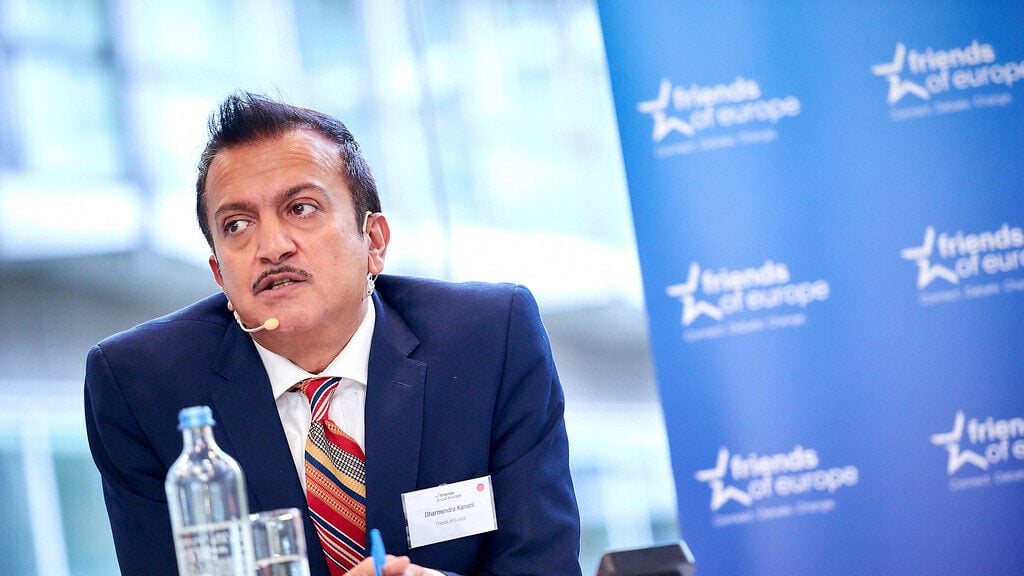
Dharmendra Kanani, Chief Operating Officer and Spokesperson at think tank Friends of Europe discussed the European Parliament elections and the prospects for the EU enlargement in an interview with Georgian Radio.
Kanani indicated that while it’s early to predict the exact nature of upcoming changes after the European elections, there’s speculation among analysts of a potential shift towards the right and even the extreme right in the future parliament. Such a shift could result in a right-wing majority unprecedented in the history of the EU.
“It’s still too early to tell what the main changes might be. We have a lot of commentators suggesting that we will see a shift to the right and the extreme right. And for the first time, we will potentially have a parliament that’ll be the most right-wing we’ve ever had in its history. So that’s one proposition. We need to be careful about how we handle some of this because there are certain things that we need to take account of. One is that there are people who are over 35, 45, and upwards who have already made up their minds. about who they’re going to vote for. The majority of the population below that age make up their minds in the last two weeks, sometimes two or three days before. And so that’s an important factor. Also, the one factor that’s not being spoken about a lot at all is there’s going to be a new generation of voters, first-time voters, in this election. 20 percent of them are young. That 20%, I would regard or call the swing vote, or the swing state in Europe. this group of young people doesn’t have the necessary same fault lines of political backing or allegiance. And for those reasons, the 20% may change things,” he said.
Regarding the challenges faced by the left, Kanani emphasized their struggle to effectively respond to these tactics.
“What we’ve seen is that people or political parties on the right have historically shaped the debate on politics at every election. In my view, this is much about the weakness of the left to not address issues that are long-term and longstanding. They’ve taken for granted their ideology and also their grasp on the electorate. What we know about the right, especially the extreme and also the centre-right, they were localized. They will go back to traditional constituency work. They will do community work, but more importantly, they’re very good at sharing information on a range of social media platforms, which is mostly disinformation, but they speak a very simple and straightforward language. When you are feeling vulnerable. You don’t feel that the politics reflects you. And this is the issue here. The right and the extreme right have this ability to decomplicate complex issues. They can tell lies in a very, very, meaningful way. And I think that’s what the problem is. It’s not a problem of the right. Ironically, I think it’s a problem of the left. And they’re not taking seriously the challenge and they’re not overcoming the differences they have on the left, which are easy to overcome. But they’re not because they’re not taking seriously the challenge to their authority,” he said.
Regarding the impact of parliamentary election results and the appointment process of new commissioners on EU enlargement plans, Kanana says, that it seems unlikely that any significant deviation will occur. Rejecting enlargement at this stage would constitute a significant departure from established discussions and decisions, triggering scepticism and doubts among stakeholders.
“I’m not convinced that the parliamentary election results and the process of electing new commissioners will affect the train that’s already left the station on enlargement. I think it would be unprecedented if the new College of Commissioners or the new Parliament would say suddenly no to enlargement because I think they would find it very difficult to do that. There isn’t a precedent to do that because it means that you would have to go back to the original council discussions commission discussions and parliamentary discussions and reopen them all. And I think people would be questioning these new commissioners or the new parliament as to why it’s doing that. Secondly, we know there’s sufficient support for enlargement, not least because of what’s happened in Ukraine. I think that right-thinking politicians know that the EU needs to complete the original peace project. And The Western Balkans, Georgia, Ukraine, represent the completion of the EU peace project and I think Ukraine has demonstrated why the stakes are so high and how high the stakes are if we don’t, both symbolically, but also in a material manner, bring these states into the EU. Because only the EU and its citizens will suffer because of other malign actors, those who do not share the values of the EU, and would find it beneficial to them for the EU to be divided, both geopolitically and economically” he declared.





